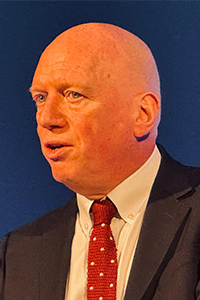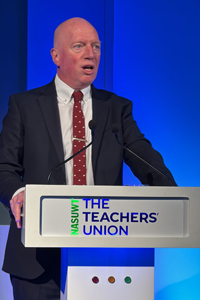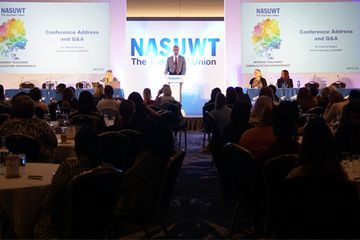The Women Teachers’ Consultation Conference offers a safe space to explore key issues and challenges you face in your career, share experiences with other women members and contribute ideas for the future of your Union.
These events are FREE to eligible members* and provide you with the opportunity to take part in seminars and workshops.
* Members who have self-identified as women with the Union. NASUWT’s view is that individuals have the right to self-identification and self-determination and the right to assert their gender identity free from fear, intimidation or penalty.
Events will be listed in this section as they become available. Tap/click for details of the event and how to book.
NASUWT conferences and events are strictly for adults only due to the nature of the content shared and no children will be permitted into any areas of the conference.
Women Teachers’ Consultation Conference 2025
The 2025 Women Teachers’ Consultation Conference was held at the Vox Conference Centre on Saturday 27 September under the theme Speaking Up, Standing Strong, Shaping your Future.
Chairing the Conference, Claire Ward, chair of the NASUWT Equal Opportunities Committee (EOC), welcomed General Secretary Matt Wrack to give the conference address.
Matt Wrack began by encouraging members to take any inspiration they felt from the Conference back into their workplaces because a union isn’t just about general secretaries or the national executive or the full-time staff, though they all play an important part.
He said, ‘It’s about our members, it’s about you playing an active role, shaping the direction of your union and therefore shaping the direction of your profession and the future of education.
‘That can only happen if members participate in our union, in a profession that is 75-80% women. If you look at our own figures, while we have made some progress, it’s still the fact that only 51.5% of our Local Association Secretaries are women.
‘There’s an opportunity for all of you attending this conference to think about how we’re going to redress that balance and what role you can play in setting out the demands and aspirations that you have for teaching and for NASUWT.’

Matt Wrack, NASUWT General Secretary
Mr Wrack moved on to the issues teachers face in education and the wider political developments affecting the union and society. He said that people had voted for change at last year’s general election, but questioned how much change was actually being delivered and whether people were satisfied with the pace of change.
‘We saw 14 years of austerity that particularly affected those of us working in public services, cuts in government funding that affected teachers’ pay and pensions, leading to the biggest ever attack on public sector pensions in modern history.
‘Many of you lived through that and saw the worsening of pensions, a squeeze on budgets in all areas of public expenditure, including school budgets, a squeeze on jobs, turning the screws on all public services, including education.
‘We have to draw up a balance sheet to see what has happened and the extent to which the aspirations of unions are being delivered. Undoubtedly, we have seen some easing up of the pressure on pay with three pay rises in a row, which are significantly improved on the previous 14 years.
‘But as NASUWT has highlighted, the pay award was not fully funded in England and we estimate that a quarter of schools will have to consider cuts elsewhere, for example in staffing, as a result of this lack of adequate funding.
‘If we look at the announcement of the spending review, which sets out the government’s aims and aspirations for public expenditure for the next three years, our analysis is that it does not match our requirements or aspirations of what is needed by teachers or what is needed to restore education.
‘The problem we had in England this year of unfunded pay rises is likely to occur again and again over the course of the next two or three years, so we face the immediate challenge of how we make the case to central government for funding to be improved if we want to deliver the world-class education that you want for your pupils.
Mr Wrack turned to policy development in the forthcoming Education White Paper, which is already causing public debate about how to deal with provision for special educational needs and disabilities.
‘We have raised questions around how the proposals will impact you in the classroom, particularly around the question of funding, because if the proposals are not adequately funded, we run the risk of simply exacerbating the situation, Mr Wrack continued.
‘The white paper is expected in November and it strikes me that the government is quite nervous about releasing it. You may have seen parents groups who have launched campaigns expressing their concerns, so before it has even been published, there is already a debate emerging.
‘We need to be an intrinsic part of that debate this autumn and into next year, setting out very clearly what we expect to be delivered, so we need your views being fed through the Union’s structures.
‘The running theme through the issues you raise with NASUWT, around workload, around behaviour, around pay, is the allocation of resources.’
Looking to wider political developments, Mr Wrack talked about the rising threat of racism and prejudice in society and the impact on schools, saying, ‘There’s an obligation on us to stand up for decency.
‘Our values as a union are about being inclusive, respecting difference and standing together. The very basis of trade unionism is about standing together and not allowing ourselves to be divided.’
‘We are facing some of the most dangerous times in recent history, with people playing a very clear game of trying to divide communities against themselves.
‘And this will be reflected in schools. When I see young people on a train abusing a passenger or children being taken to protests outside asylum hotels, I wonder what impact hearing and using the racist language we’ve fought against for decades is having on the minds and thinking of our children.
‘We are a diverse workforce, we’re a diverse union and we teach a diverse community of children - we make no apologies for that.’
‘Another aspect of what’s happening on the far right today is misogyny. The union has done some powerful work around the impact of misogyny in schools and we’ve had some very high-profile cases that we’ve taken up.
‘But the sad truth is that some young people are being influenced by social media, by far-right activists who are promoting a particular view of society that sees women very much in a subordinate position
‘For a profession that is overwhelmingly female, that poses a particular challenge, a challenge NASUWT cannot skirt away from.

What role can you play in your union?
Referring to what he called ‘very, very difficult and challenging times’, Mr Wrack said what lies behind some of the disaffection is a deep frustration among many people at what they perceive to be a failure of the political system.
‘We live in the sixth richest country in the world, but millions of people don’t feel like they live in the sixth richest country in the world. Many of the children you teach, and their parents, don’t feel like they live in the sixth richest country in the world.
‘NASUWT can’t avoid addressing these bigger questions because of the impact in the classroom, the impact on you.
‘I want to finish on the question of maternity rights. There are different positions in the different parts of the UK, but if we take the bare minimum that teachers might be entitled to, it is quite shocking that a teacher might be entitled to just four weeks of full pay on maternity leave after a year’s service.
‘It’s not surprising, therefore, that our own national survey found that 84% of respondents maintained that the current level of maternity pay is an obstacle to taking more time after the birth of a child or that the biggest group of leavers from the teaching profession are women between the ages of 30 and 40.
‘We intend to launch major campaigns to deliver improvements in maternity pay, paternity pay and other parental leave arrangements, as well as flexible working that mothers might want on return to work.
Referring again to plans in the Government’s white paper to modernise terms and conditions for teachers, Mr Wrack added, ‘One way they could genuinely modernise terms and conditions for teachers is by dramatically improving maternity provision.
‘As you know, I was formerly the general secretary in the Fire Brigades Union, which has a very different workforce profile with very few women, but on their initiative, they put employers on the spot, they organized unofficial lobbies and they forced employers to talk to women.
‘I was proud to lead those negotiations, because we more than doubled maternity pay as part of that year’s settlement in 2023, so the minimum now in the fire and rescue service is 26 weeks’ full maternity pay.
‘If it can be done elsewhere in the public sector, there is no reason whatsoever why it shouldn’t be done in teaching.’
‘Improvements to maternity pay could dramatically improve the working lives of women teachers and therefore do something substantial, something practical, that begins to address the recruitment and retention crisis, by making teaching a career that women are not worried about whether they can stay in, one where they can raise their children while remaining in the profession.
‘It takes all of us to become involved in that work, all of us thinking about what we can do to win the arguments, to get other people involved, to get colleagues to join the union, to encourage people to attend meetings, or go on a union course, to becoming a Rep.
‘I’ll finish where I started. I urge you, if you want to see changes, if you want to work together to make those changes, then think about what you can do after this conference to increase your own activism.
‘Only together can we build a powerful union that can make change happen so that we can deliver and improve outcomes for teachers and children alike.’
Claire Ward, NASUWT EOC, chaired a Q&A session where members put individual questions to Mr Wrack. Topics raised by members included:
-
visibility of the union as a group in standing up to racism;
-
the union’s view on digital ID cards;
-
the increase in retirement age; and
-
the role NASUWT has played in empowering teachers to collectively brining about change.
Jane Peckham, NASUWT Deputy General Secretary, introduced author and motivational speaker Jaz Ampaw-Farr who talked about The Power of Everyday Heroes.
Ms Ampaw-Farr enthusiastically reminded members of the important influence teachers have in children’s lives, saying, ‘Your work changes lives.’ She talked about how teachers can ‘upscale’ their own compelling story through her Jazlow's Hierarchy of Needs, her own humorous nod to American psychologist Abraham Maslow.
Going on to describe her own experience of surviving childhood sexual abuse, she credited her primary school teacher’s inspiration for her escape from the cycle of manipulation and exploitation.
Watch Jaz in action
An interactive discussion with members of the Women’s Advisory Committee entitled Your Opportunity to Shape your Union was led by Claire Ward. She was joined by three members of the Women’s Advisory Committee:
-
Sally Rees, Vice-Chair Northern Ireland Executive Committee
-
Candida Mellor, North Tyneside Assistant Secretary, Chair of North East Equalities Committee
-
Dianne Reynolds, Peterborough Local Association
Highlights
Workshop sessions
The workshop sessions were available twice to enable each member to take part in two sessions.-
Take Charge: Women's Bladder Wellness Workshop
-
Dr Zena Wehbe, Principal Scientist at Jude Bladder Health
-
-
Know Your Rights: Sexual Harassment at Work
-
Laura Bolam, Legal Officer (Employment Law) at Rights of Women
-
-
Step up Sisters - Allyship in Action
-
Catherine Myerscough, NASUWT Principal Official (Equality and Training) and
-
Claire Ward, Chair of the NASUWT Equal Opportunities Committee
-
The day was rounded off with another whole-group session entitled Restore and Recharge: Wellness Techniques for Teachers presented by Sarah Hunt, Wellness Specialist, and an opportunity for women teachers to socialise and to continue the important conversations they had begun during the day.
Don’t miss out
If you’re not yet a member but want to attend our Women Teachers’ Consultation Conferences, and get access to other exclusive member benefits, why not join today?
You can find out more about why you should join us or go straight to our Online Joining site to take full advantage of our wider programme of events, training and discount scheme.
Want more influence?
The NASUWT is a member-led Union, which means you getting actively involved in your Union to support your colleagues and fellow teachers at work.
Getting active in the Union can take a variety of forms and will mean you get access to FREE training, support, and personal and professional development: you can be proud in the knowledge that you are undertaking a role that helps teachers in their workplaces.
Calculate your travel carbon footprint
As part of our commitment to reducing our carbon footprint, particularly at our conferences and events, we'd like to share a tool allowing you to understand the environmental impact of your journey and identifying low-carbon door-to-door travel plans that help you towards net-zero travel.
Try the You.Smart.Thing travel planner.
Anonymous feedback
If you require a response from us, please DO NOT use this form. Please use our Contact Us page instead.
In our continued efforts to improve the website, we evaluate all the feedback you leave here because your insight is invaluable to us, but all your comments are processed anonymously and we are unable to respond to them directly.



